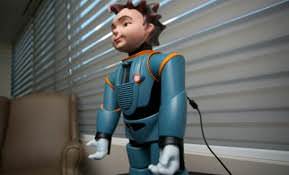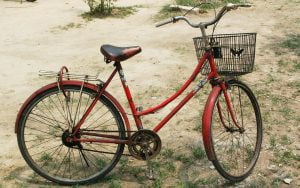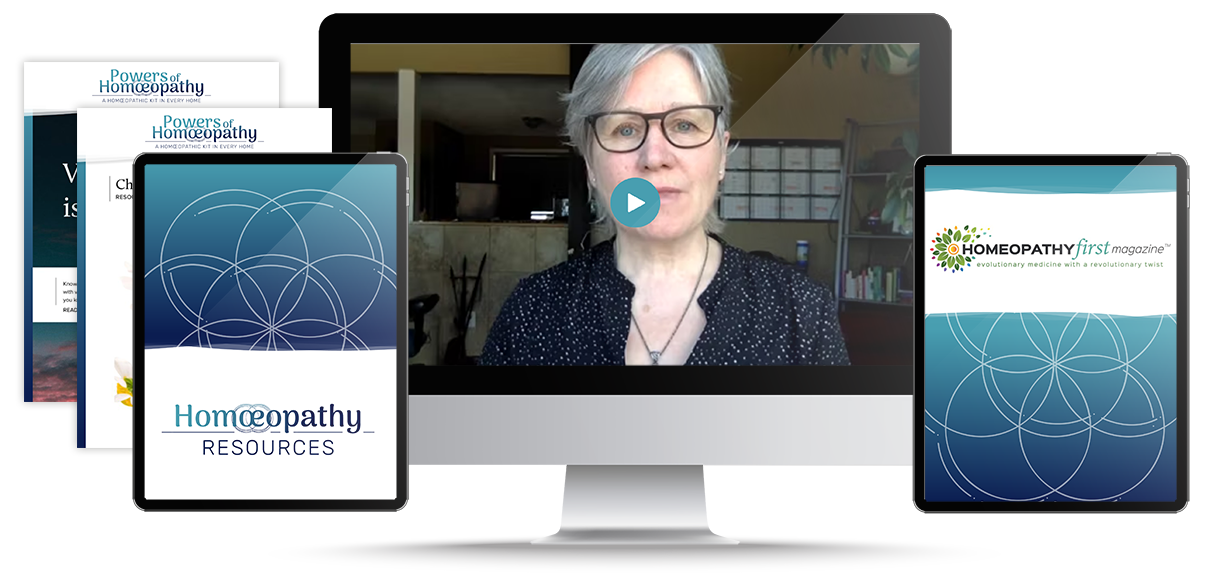After reading this morning’s National Post story (and listening to the video on the website edition of the article) “Robot deployed to help dementia sufferers” , I am left utterly at a loss for words as I sort through a multitude of thoughts and feelings. In fact, I am tempted to use some very bad words to express the horror of what I have just read.
I am sure that the inventor had every good intention when designing the robot. Pretty sure he is an intelligent man but I wonder…does he have a parent or loved one with dementia? Have all the possible scenarios and outcomes been considered?
As the article points out “There’s a very clear link between someone’s expressive ability with language and the progress of Alzheimer’s disease, generally.”
Let’s begin at the beginning of the article with the title and the language used in the headline “deployed”. Where did you last hear this word used? Or what is you first association with deploy, deployment or deployed? Me? Military. Here is the dictionary definition:
Full Definition of deploy
- transitive verb
- 1 a: to extend (a military unit) especially in width b: to place in battle formation or appropriate positions
- 2 : to spread out, utilize, or arrange for a deliberate purpose <deploy a sales force><deploy a parachute>
Ludwig the Robot (dressed to look friendly rather than military – looks a bit creepy to me) is being ‘deployed’ to be the eyes/ears and sensing machine to ‘listen/see and assess’ via robotic conversation with our loved ones who have dementia/Alzheimer’s.
Where does the robot Ludwig idea land with you? Kind of cute? Kind of like how we use technology to teach little kids, now we have the potential to use technology with our elders? Harmless? Maybe helpful?
Or maybe like me, you have some strong objections to the military deployment of artificial intelligence to gather intel on one of our most vulnerable populations? The frail. The elderly. Those who most need our human love, touch, tenderness and listening are now being assessed by a robot?
“People who work with individuals with Alzheimer’s disease…could use a little bit of extra help, which is what we’re trying to build.”
Sounds reasonable, doesn’t it? Sorta. Kinda. But really? A robot?
“Based on (Ludwig’s) analysis, we can tailor-make and customize the care the individual receives.”
Ah…so Ludwig is a tattletale too? Makes a judgment based on a conversation with someone who is care dependent, tells the doctors and then what? More prescription meds? Go ahead…imagine the scenarios. I guarantee you there will be no room in the assessment/prescription for ‘more touch by loving humans’ or ‘more conversation needed with loving humans’ or ‘better nutrition’.
Hmmmm…we have a phrase in this household about these kinds of situations where an idea seems good at the time but in the near future drawbacks become evident. Our short hand communication when the bad news flashes on the screen or makes the next headline is ‘we thought that might happen’ but we simply say to each other, ‘unintended consequences’.
Being with Loved Ones
Care of dependent children is a challenging task at the best of times. Caring for kids with chronic disease adds a heavier burden on the main caregivers. Caring for kids with brain injury/inflammation from heavy or repeated environmental toxins moves it up another notch.
Care of our aging bodies and other adults too can be challenging at the best of times, especially if we refuse to slow down and move at a different pace or refuse to acknowledge the person living in a body that has more needs than it used to…our own included. Caring for adults with dementia or Alzheimer’s or MS or Parkinson’s adds a heavier burden on the main caregivers too, whether the caregivers are in an institution or a family member who gives care.
Does that mean we turn to robots to make assessments about how our loved one is doing?
A Personal Story
Many of you know both Ron and me personally and I have written previously about my mother-in-law Fernie, an amazing,bicycle riding and colorful (the word most folks used to describe her) woman who passed away June 6 of this year. The last three years of her life were spent in a nursing home situation where even there, she charmed everyone and everyone loved her.
 Every time I see an adult on a bicycle, I no longer despair for the future of the human race”. H. G. Wells
Every time I see an adult on a bicycle, I no longer despair for the future of the human race”. H. G. Wells
Our family became a part of the caregiving network at Cedars Villa. If it takes a village to raise a child, it takes a village to care for our elderly. Nursing homes can be loving, caring places but what makes them that way are the people – those who work there and those who visit loved ones.
My husband Ron who is technology averse, decided to write about his mom’s passing at the nursing home and post it on his new FB account. Technology? Yes, but technology that is about sharing his experience of love…and being with his mom as she died. So there is a place for technology.
What is most poignant for me in his reflection is the ordinariness of life and the extraordinary moment of his mom’s dying.
Here is what he wrote:
My mom passed away about 1 month ago, June 6th at 9:45PM. I went to work that day. Heather phoned and said mom was quite unresponsive. I said I would finish my day and go to the nursing home after work. I phoned my brothers Doug and David to say I was going up. Doug said he would go mid-afternoon and David said he would be there at 7PM. I got up there around 5:30. Mom was breathing heavily like she had been running a race. David and Cheryl came around 6:45. They left around 8:30. One of the aides came in and told us that we should stay awhile or all night because mom likely wouldn’t make it.
There was a puzzle in the room and I worked on it some. Just after 9PM mom’s breathing got slow. Doug and I sat on either side of the bed holding mom’s hands. Her breathing got very very shallow. It seemed like it stopped a few times. At about 9:45 I said to mom ‘It’s OK, you can goo if you want. I will look after everything.’ Mom got two big tears in her eyes that rolled down her face and cheeks and she quit breathing. One of the aides was in the room and she went to get one of the RN’s to come and declare that mom had passed.
Then one of the African aides came in and realized that mom had passed. She told the other staff. She told us this is the time we can talk to your mom, to Fernie. I said, it’s too late. She has already passed. They said, no this is the time; her spirit is in the room listening and watching. So for about an hour, we sat around telling stories about mom, laughing and crying. It was a good experience for me and for my brother Doug.
There was a male Sikh nurse who poked his head in while the female staff was there. After all the women left, he came in and wanted to sit by mom. He took her hand and talked to her some and then had a good cry. Then he said, Sikh men don’t cry in front of women so that is why he waited. Doug and I thanked them all for doing their part and being a part of mom’s life.
The last words I think I heard mum mom say was to my younger brother David.He said he loved her and she said that she loved him. I believe those were her last words. In hindsight, over the last month, thinking about being with mom, we always told her, me and my brothers and sister, that we loved her and she always told us that she loved us. It’s one of the only times I’ve heard my brother Doug say he loves someone. It’s not something our family did much. And we said it lots while mom was in the lodge. It will be something I miss.
Tomorrow we spread her ashes. Watch for an update. Thanks for your time to read this. Thank you for the cards and kind thoughts shared with the family this past month.
Although technology is great and I love it, Ludwig the robot seems misplaced. If caregivers need support, then let’s find a human solution. If those with dementia/Alzheimer’s need support, then let’s find a human solution. Touch, listening, laughing, puzzles, music…simple ordinary.
Yours in health and healing and apparently in strong opinion about the place of robots in the care of our elders,
Donna




